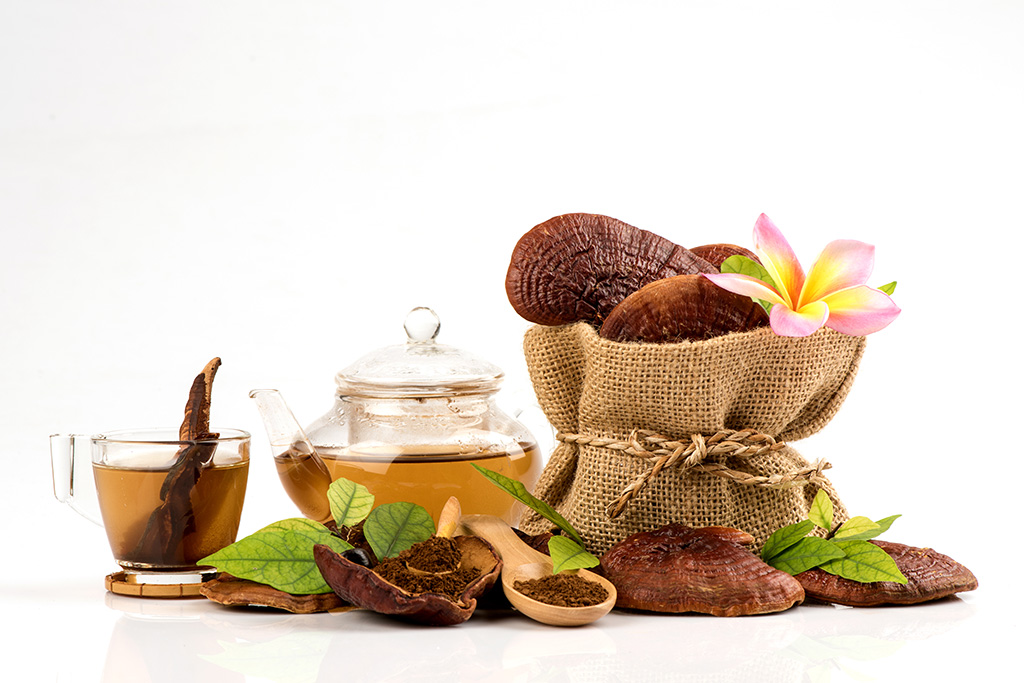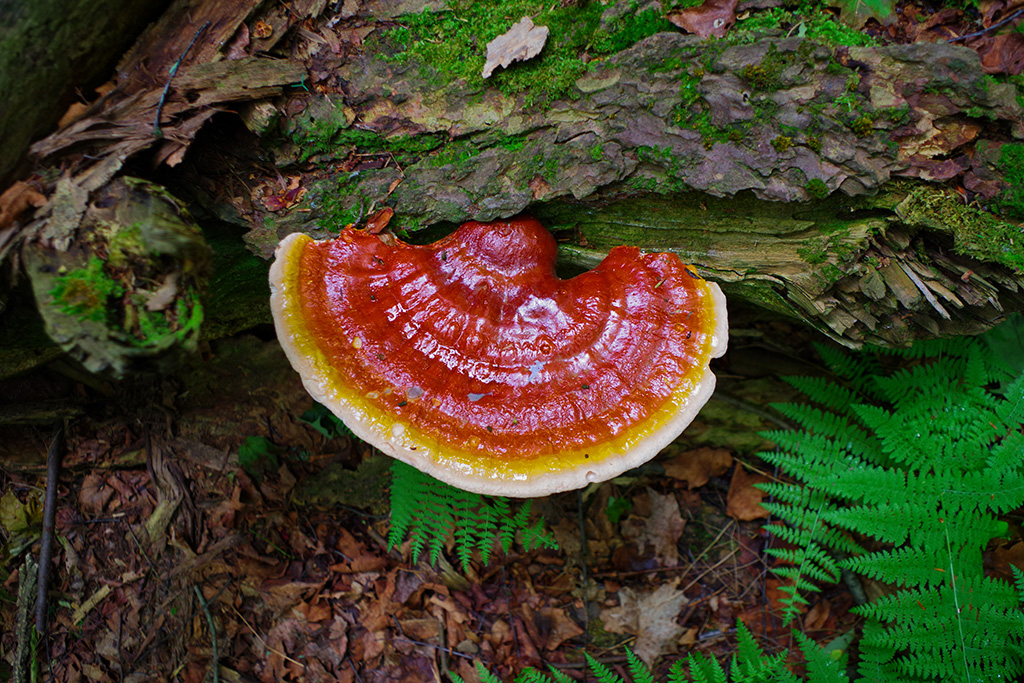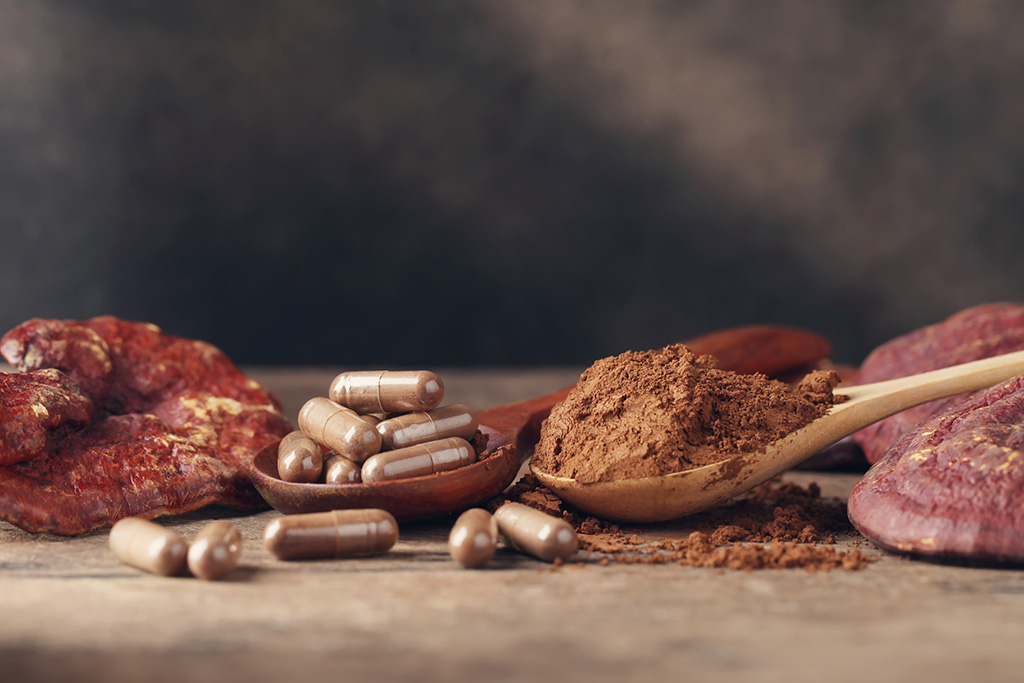Reishi mushroom, also known as Linghzi, is a polypore fungus with a signature kidney-red colour to it. It is believed to provide various health benefits, including the lowering of cholesterol, regulation of blood pressure, and an immune system boost to name a few. Humans have been consuming Reishi for over 2,000 years and it has a rich, respected history in Chinese culture.
The official name for the species is Ganoderma Lucidum, or Ganoderma Lingzhi, but it has been referred to by numerous names and mantras over the centuries. A name that appears often is Linghzi, though this itself is a Chinese name with a selection of possible translations; it can mean “divine mushroom”, “soul mushroom”, or even be interpreted as the “mushroom of immortality”.
The first known uses of Reishi mushrooms date back to the Han dynasty when the mushroom was treasured because it was commonly believed to possess potent healing properties. It took many more hundreds of years before people understood enough about Reishi to begin cultivating it. This meant that the only way to originally acquire Reishi was to find the elusive fungus. Due to the humidity required for its growth, Reishi could only be found deep within forests at the base of mountains, giving it a near-mythical status among mushroom hunters.
Reishi mushroom health benefits were understood to be varied and helpful in the treatment of several health issues. The boons of the fungus are believed to include stress-relieving properties, immune system fortification, lowering of blood pressure, and possible anti-cancer effects.
Many of these health perks that Reishi is understood to provide are attributed to the high levels of beta-glucans in the fungus. Beta-glucans are a type of polysaccharides that are believed to help minimise the absorption of cholesterol molecules in the stomach, this in turn aids in the maintenance of a healthy blood pressure level. Addressing hypertension problems is beneficial for a number of health issues, including diabetes, heart disease, and other cholesterol-related illnesses.
Despite the many potential health assets that Reishi provides, it does have one very divisive factor; its flavour. Reishi has a deep and earthy taste to it but it is also very bitter, in combination this creates a flavour that can be off-putting on its own. Thankfully, you do not have to eat a plateful of raw Reishi to reap the benefits. There are a variety of recipes out there along with alternative ways to introduce it to your diet. Popular options include Ganoderma tea, reishi capsules, reishi powder, and reishi tincture (our recommended reishi supplement type).

How Does The Reishi Mushroom Work?
Reishi has been used to complement the treatment of health conditions for generations. It is believed that this fantastic fungus can make you feel less fatigued, help fortify your immune system, decrease stress, and improve sleep patterns.
The benefits of Reishi are understood to come from a few key components of the mushroom. These include beta-glucan polysaccharides, ganoderic acids, coumarin, mannitol, and alkaloids. To understand precisely how these active ingredients work we will need to break down what they do and what health benefits they may provide.
What Are The Health Benefits Of The Reishi Mushroom?
Throughout its history, reishi has been used in the treatment of many ailments. Ancient Chinese herbalists believed that it promoted long lifespans while today it supplements the treatment of various health issues.
Reishi is taken in support of treatments for diabetes, high blood pressure, fatigue, and even more serious conditions such as cancer. To ascertain the precise properties of reishi, various studies have examined its effects on various body organs, systems and conditions.
Lingshi And The Heart
Maintaining a healthy heart can be a difficult task as it requires a delicate balance of activity and the correct nutrition for your body. Reishi can potentially ease this difficult process by lowering blood pressure, providing an anticoagulant effect, and encouraging the absorption of healthy HDL-cholesterol molecules. The body needs healthy HDL(high-density lipoprotein)-cholesterol molecules to build cells; issues arise when the body absorbs too much LDL(low-density lipoprotein)-cholesterol as this may lead to heart disease.
Helping keep blood flowing at a normal pressure and thickness, Reishi may also possess anticoagulant properties. In one study it was observed that the beta-glucans in reishi extract may encourage anticoagulant activity. This is the process of blood-thinning that helps prevent or slow the creation of blood clots.
Tests have also observed that regular consumption of Reishi may lower overall cholesterol along with levels of triacylglycerol and LDL-cholesterol. Lower overall cholesterol levels can help prevent dangerous heart conditions but further studies are required for us to fully understand what benefits Linghzi may provide for our hearts.

Lingzhi And Cancer
A considerable amount of research has been undertaken into how Reishi can support cancer treatments. Many of these studies have found promising suggestions that Lingzhi may provide anticancer benefits but it is agreed that further human testing is required before any conclusive verdicts can be reached.
One test examined the effects of 58 different mushroom species on cancer cells in rodents. The study observed that, in comparison to the other tested fungi, reishi mushroom extract had a significant cytotoxic effect against the cancer cell lines. Cytotoxicity is the property of being toxic to a cell, helping to damage and even kill that cell. Although these results are encouraging, the tests have not yet been extended to humans so we cannot be sure of how human cancer cells would react in the same situation.
Along with research into whether Reishi can support the destruction of cancer cells there have also been studies into whether Reishi can help stop the cells from proliferating. A study into the effects of selenium-enriched reishi mushroom extract on leukaemia cells made a hopeful observation. The study observed an antiproliferative effect, potentially helping arrest the cancer cells. It was concluded that a reishi extract may be a beneficial dietary supplement but additional tests are needed before any benefits can be clarified.
Lingzhi And Weight Loss
From a nutritional perspective, Reishi has many features that make it an attractive addition to a healthy weight-loss diet. Reishi mushrooms have a high protein content while being low in fat and can easily be introduced to a daily routine.
The fruiting body of reishi mushrooms is tough and rubbery but thankfully there are a variety of other ways to introduce the supplement, including powders and tinctures. It might be stating the obvious, but Reishi is also not meat, meaning it can represent a valuable source of nutrition in not only weight-loss diets but vegetarian and vegan diets too.
Lingzhi And The Immune System
Many people value Reishi as it is believed to enhance the performance of the human immune system. A study that examined the immune systems of mice on a diet supplemented by ganoderma lucidum extract saw an increase in natural killer cells, compared to the control group on a non-supplemented diet. Natural killer cells, also known as NK cells, play a vital role in our immune systems as they target and eliminate virally infected cells. The fruit body of reishi has also been found to contain a small amount of lectins, a form of glycoprotein that helps with the binding of carbohydrates. The ability of lectins to identify carbohydrates can potentially help the immune system recognise bacteriaearly. While these effects could be great for human immune systems, studies have mainly been focused on animal testing and further evidence is needed before we can say for sure what reishi does for our immune responses.
Lingzhi And Diabetes
Diabetes affects millions of people across the world, 1 in 10 people over 40 in the UK have a type 2 diagnosis and the number of cases is growing quickly. The unmissable presence of diabetes in society has motivated thousands of studies; searching for dietary guidelines and supplements that can help in preventing and managing the condition.
One of these studies observed the effects of Ganoderma lucidum polysaccharides on diabetic rats and discovered some positive indicators. Levels of blood sugar and insulin decreased, suggesting that reishi may have hypoglycemic properties.
Despite promising results from certain tests, human studies have reported varied and inconsistent results, some have supported observations of anti-diabetic properties made in animal testing while others reported no change. For us to fully grasp what effects Reishi may have on blood sugar, more in depth testing is required.
Lingzhi And Lungs
While it is understood that reishi mainly affects the stomach and the absorption of certain nutrients, it is also believed to potentially be beneficial for our lungs. One study took Ganoderma lucidum polysaccharide peptide from reishi and observed its effects on a test group of mice. The study noted that the reishi polysaccharide may slow the proliferation of lung cancer cells and encourage anti-angiogenesis.
Angiogenesis is the generation of new blood vessels, a process that tumors encourage through chemical signals in order to grow. Stopping angiogenesis when it is not required can play a vital role in preventing cancerous tumor development. Although these results are promising, more research will need to be done before we can say if, or how, these effects may translate to humans.

Reishi Mushroom Supplements
There are a variety of methods for introducing reishi to our diets. Supplement options include powders, teas, and capsules but the most effective option is a tincture.
Tinctures are considered the most efficient form of supplement as they utilise alcohol soaking to extract the essential active ingredients in a concentrated liquid. The high concentration of tinctures also means they are very easy to take. They do not need to be made into a drink or mixed into a meal because all you need is a couple of drops.
Dosage & How To Take
The recommended dosage for Reishi will depend on the specific supplement you are taking. It is always recommended that you fully read the instructions for a supplement and consult a medical professional before adding it to your diet.
In most circumstances, a reishi mushroom supplement can be taken once a day for optimum results. If you are using a tincture it can be as simple as a few drops under the tongue in the morning to prepare yourself for the day ahead.
Are There Any Negative Side Effects?
It is important to consult your doctor before introducing reishi supplements to your routine. This is especially important if you are pregnant, breastfeeding, diabetic, have an autoimmune disease, or regularly take any form of medication.
In rare circumstances, Reishi may also cause an allergic reaction, including but not limited to a rash and dryness within the mouth, nasal passages, and throat. Reactions are very uncommon but it is better to be cautious, especially if you have previously experienced an allergic response. Always check the ingredients and instructions before taking any form of supplement.
Summary
Reishi has a rich and fascinating history as both a valuable resource and a potent dietary supplement. Yet it has only been within the past few decades that we have begun to unlock the true secrets of this almost-mythical mushroom. Reishi is believed by many to provide health benefits for our hearts, lungs, blood sugar, and immune systems and there have been many promising studies that suggest reishi can provide these various benefits. Thorough tests on humans are required before a reliable and corroborated conclusion can be reached on the possible reishi mushroom benefits, but that has not stopped thousands of people from invigorating their day with reishi.
Where To Buy Reishi Mushrooms In The UK
Reishi mushroom products, including tincture extract, are available in specialist high street shops and can be ordered online from stores like this one.
